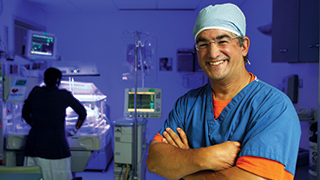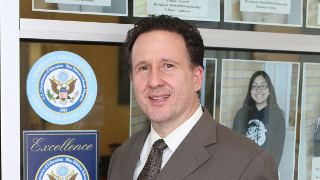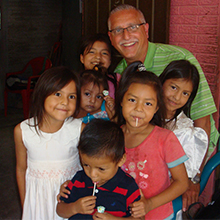Meet Our Diaconal Candidates

One might say that the diaconate also “chose” Michael. His journey as a deacon began as a casual suggestion from some of his friends – one that he didn’t take seriously at first because “I didn’t think I was worthy to serve in such a public way.” With time and prayer, however, he realized a true calling to the diaconate that he simply couldn’t turn down.
Ultimately, his path led him to the Center for Diaconal Formation – a program whose sense of community has truly struck a chord with Michael. “Our class has been through many life experiences that have drawn us together in prayer and support,” he says. “There have been major illnesses and even death among us and our loved ones. To see the support that wells up from the group is to watch God’s love at work.”
He continues, “The sense of community and shared work is something I’ve never experienced before in an academic setting. We have become family to each other.”
For Michael, that sense of community is what bridges the gap between science and religion, making it easier for him to share his faith in a secular environment. “When you care for people and show them compassion and love, it’s often easy for them to see the deeper well from which those things come,” he says. “Just being open to sharing your concerns is often all you need to then open the door of sharing your faith.”

It wasn’t long before a parochial vicar at Stephen’s parish, Father Joseph Meagher, started encouraging him to become a deacon. “He must have sensed inside of me a desire to serve the Lord more profoundly, so I searched within myself, discussed it with my wife and submitted an application to the Archdiocese of Newark,” he says. He was accepted.
After about a year reflecting on becoming a deacon in the diaconate program, his class was given the news that they would be studying at Immaculate Conception Seminary School of Theology through the Center for Diaconal Formation – and Stephen was thrilled to return to his alma mater. “Learning in a supportive community like Seton Hall, with the added benefit of being in formation with other diaconal candidates, helps me clear up uncertainties and pursue the joy of my life: growing closer to God,” he says. “My brother candidates and I are strengthened in our commitment to God through our mutually supportive, faith-filled bond.”
That commitment is integral to the way Stephen lives his life every day – and is certainly present in his role as an educator. “I never stop thinking about ways to be a better educator,” says Stephen. “I pursue ways to be motivated with, and be motivated by, the truth. And I help others through struggles and sufferings, letting them know that with faith, all things are possible." He adds, “If I did not have faith in God and work at living and sharing it, then my life would be devoid of completeness and contentment.”

Three years later, Peter was a founding member of the organization “We Feed – Woodbridge,” which assists local food pantries in securing adequate food supplies for needy families in the Woodbridge Township community. According to Peter, in 2013 the group collected and distributed over 80,000 lbs of food and raised over $40,000 for pantries in the area.
With these and similar experiences under his belt, Peter decided to take his social justice ministry to the next level and began working with the Diocese of Metuchen’s Catholic Charities Solidarity Team, which aims to reduce injustice and suffering for the poor, both at home in the diocese and overseas. “I’ve had the privilege of traveling to Santa Rosa, Guatemala, with the team to work on food securities, clean water, literacy and medical projects,” says Peter. More recently, he traveled to El Salvador with the Maryknoll Mission to accompany them in their daily ministries involving child and adult literacy, HIV/AIDS outreach and health care.
Currently, Peter works with Deacon Sam Costantino of the Diocese of Metuchen at the “Deacons’ Table,” a soup kitchen where Metuchen deacons volunteer to serve weekly pasta dinners to the less fortunate.
Throughout his social justice ministry, Peter remained active in his parish in various ways, but eventually he began to ask God for more direction for his life. “I pondered the thought of the diaconate but thought I was too busy, not smart enough or even unworthy,” Peter admits. After a deacon in his parish invited Peter to an information session for the upcoming formation class of deacons, he found himself being drawn deeper into the discernment process and ultimately realized that it truly was his calling.
“Here I am today, a member of the first class from our diocese to graduate from the Center for Diaconal Formation program,” he says. “Each class I’ve taken at Immaculate Conception Seminary School of Theology draws me deeper into the knowledge of my faith. It has given me a more profound understanding of our Catholic faith and has taught me to use the knowledge I’ve gained to continue working in social justice and other ministries.”

